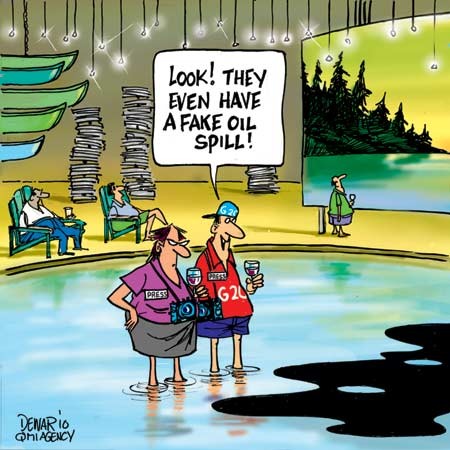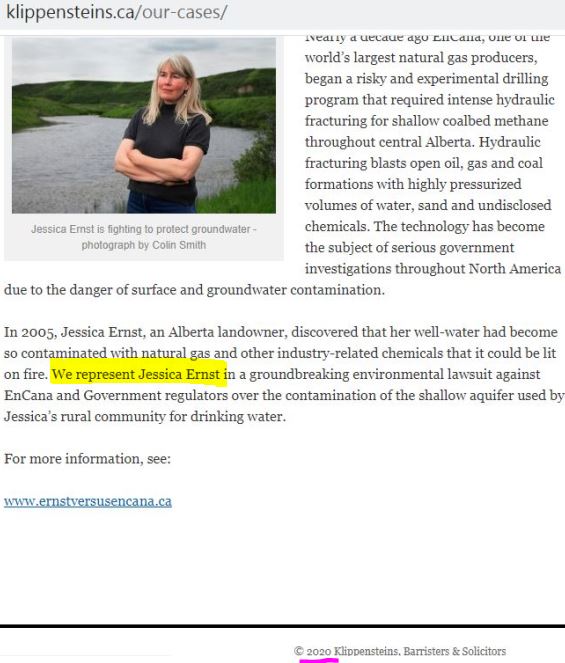None of this settlement will come out of the pockets of the politicians leading Canada when the rights violations happened, or any of their soldiers of abuse and aggression – the police.
Only the people will pay.

A few of the comments to the CBC article:
Al Millar
Fake Lakes , gazebos and head bashing police . Harper’s proud G 20 moment .
Rex Yuan
Why we taxpayers are always stuck with the bills on poor/illegal decisions our politicians made? We should have a law to award costs to the responsible political party. That then would be true accountability by ensuring our politicians think twice before making a decision.
Krikor Aghajanian
Should force the PCP and Harper to pay the full amount.
Zahava Goldfinkel
After all these years, the taxpayer is still paying for Harper’s G20 party.
Settlement Reached In 2010 G20 Summit Class Action Between Toronto Police And 1,100 Mass Arrested Demonstrators Press Release by Eric K. Gillespie Professional Corporation, Aug 17, 2020, newswire.ca
TORONTO, Aug. 17, 2020 /CNW/ – After ten years of court proceedings and negotiations, the Toronto Police Services Board and representatives of about 1,100 individuals and public demonstrators who were mass arrested at the 2010 G20 Summit in Toronto have signed a comprehensive and unprecedented class action Settlement Agreement.
The Settlement Agreement is a three-part package that includes individual financial compensation totalling up to $16.5 million for those who were mass arrested and detained, a public police acknowledgement regarding the mass arrests and the conditions in which protestors where detained, and a police commitment to detailed changes regarding policing of future public demonstrations. The Settlement Agreement also provides for the expungement of police records of those allegedly wrongfully mass arrested.
Under the Settlement Agreement, those arrested will be entitled to monetary compensation of between $5,000 and $24,700 per person, depending on their experiences.
During the G20 Summit of world leaders held in Toronto in June of 2010, many public demonstrations were organized on public issues such as climate change, global poverty and other issues. Thousands of protestors demonstrated peacefully, but the protests were also accompanied by deliberate vandalism by some individuals.
Toronto police reacted by encircling large groups of hundreds of protestors in several locations in downtown Toronto with cordons of riot police, holding them for hours, and then transferring many of them to a temporary Detention Centre where hundreds of protestors were held in extremely harsh conditions. Ontario’s Ombudsman at the time called what happened “the most massive compromise of civil liberties in Canadian history”.
The lawsuit was launched in August of 2010 by Sherry Good as legal representative of the approximately 1,100 class members, later joined by Thomas Taylor. Toronto Police Services objected to the class action proceedings in court, and class action status was not finalized until a police appeal to the Supreme Court of Canada was dismissed in November of 2016.
Class Representative Sherry Good said: “The terrifying way in which I and 400 others were suddenly and arbitrarily surrounded and held by riot police on a street corner for four hours in a freezing downpour changed forever the way I look at police, continues to give me chills. I believe that this Settlement Agreement does bring about some justice, and I hope, and I think, that our freedom of expression rights will now be better respected for a long time to come.”
Thomas Taylor, also a Class Representative, said “For me and hundreds of others, being suddenly surrounded and held captive by frightening numbers of riot police when we had done nothing at all, going through violent and unlawful arrests, and then being thrown into a nightmare detention centre, was a stunning and horrifying experience. I had never imagined that such a thing could happen in Canada, but that experience showed me how very fragile civil liberties are for so many of us. I truly hope that this Settlement Agreement will help make sure that such a thing never happens again.”
The class action was lead from the beginning by Toronto litigation lawyers Murray Klippenstein and Eric Gillespie. According to Gillespie, “When these events happened many Canadians could not believe they happened in Canada. The settlement appears to fairly recognize through financial compensation, acknowledgements and reforms that they shouldn’t have happened and will never happen again”.
Murray Klippenstein commented that “Canada had never seen anything like what happened at the G20 Summit, and hopefully it never will again. We are hopeful that this settlement will bring some justice and some relief to class members, and that we all, including the police, can benefit in the future from the acknowledgements and commitments to policing improvements that are built into the Settlement Agreement”.
Under Ontario class action laws, a class action settlement agreement must be reviewed by a Superior Court Judge for final approval, and the Settlement Agreement is scheduled for an approval hearing before Justice Edward Belobaba on October 19, 2020.
Lawyers Klippenstein and Gillespie have urged anyone who was present in June of 2010 and who might be eligible for compensation to contact them or to review the G20 class action website. A copy of the Settlement Agreement is available on the website for review.
For further information: Eric Gillespie, 416-436-7473 (call/voicemail/text); Murray Klippenstein, 416-598-0288
Related Links
www.gillespielaw.ca
$16.5M settlement reached in class-action lawsuit over mass arrests during 2010 G20 summit, Compensation for those arrested will be between $5,000 and $24,700 by The Canadian Press, Aug 17, 2020, CBC News
The agreement comes after 10 years of court proceedings and negotiations between the Toronto Police Services Board and representatives for about 1,100 people who were arrested during the summit.
Under the settlement, those arrested will each be entitled to compensation between $5,000 and $24,700, depending on their experiences.
The deal also includes a public acknowledgement by police regarding the mass arrests and the conditions in which protestors where detained, as well as commitment to changing how protests are policed in the future.
Those who were wrongfully arrested will also have their police records expunged.
Thousands participated in demonstrations
Toronto hosted the G20 summit of world leaders in June 2010.
Many public demonstrations were organized to address issues like climate change, globalization and poverty. Thousands of protestors demonstrated peacefully, but some protests were accompanied by deliberate vandalism.
Police reacted by encircling large groups of hundreds of protestors in several locations in downtown Toronto with cordons of riot police, holding them for hours, and then transferring many of them to a temporary detention centre.
The lawsuit was launched in 2010 by Sherry Good as the legal representative of approximately 1,100 class members. The Toronto Police Service initially objected to the class-action proceedings in court, and the class-action status was not finalized until November 2016.
“When these events happened many Canadians could not believe they happened in Canada. The settlement appears to fairly recognize through financial compensation, acknowledgements and reforms that they shouldn’t have happened and will never happen again,” said Eric Gillespie, a Toronto litigation lawyer leading the case with Murray Klippenstein.
Klippenstein and Gillespie are urging anyone who was present at the June 2010 G20 riots and who might be eligible for compensation to contact them or review the G20 class-action website.
With files from CBC News

Refer also to:
August 26, 2019: Precisely a year after Murray Klippenstein and Cory Wanless abruptly quit the Ernst vs Encana lawsuit (taken on 3 years before the G20 class action), I finally received my trust account funds of $40,000.00.
The lawyers also did not quit the Choc vs Hudbay case which they took on years after taking on Ernst vs Encana and they still (nearly two years after quitting) list my case on the law firm’s website, without stating they abandoned it, the public interest, our drinking water and me.
[October 25, 2020: I observed that Klippensteins finally no longer dishonestly includes my case on their website. The snap below was taken in June 2020; I also continued to see my case listed on the firm’s website months after that.]

As of the date of this post, it’s 715 days I have not yet received my files (all legal charges paid in full including extremely expensive photocopying) from Klippenstein or Wanless – violating law society rules, and which I need to continue my lawsuit and which the lawyers promised (in writing) would be sent to me after they quit in August 2018.
Are they deliberately working to destroy my lawsuit to punish me for refusing to let Klippensteins kill my lawsuit?
Law Society Ontario Rule 2.09, withdrawal from representation
2020: Cabot Oil and Gas gets frac’d! Pennsylvania AG Shapiro files 15 criminal charges, including 9 felonies, against Cabot for failing to fix gas wells that leaked methane over 9 square miles into 18 Dimock residential water supplies. “The Grand Jury presentments prove that Cabot took shortcuts that broke the law, and damaged our environment — harming our water supply and public health,” Refer to 2013 links below to see how Cabot bought and “settled” it’s way out of the company’s crimes.
Shell announces £55m payout for Nigeria oil spills, Settlement avoids London High Court case
2014: Chesapeake faces new charges; Encana settled criminal charges by paying 5 times the maximum penality
2014: Alberta Fort McKay First Nation settles, drops lawsuit against Athabasca Oil Corp
2012: $1.6M settlement in Pa. gas drilling lawsuit
But Jared McMicken of Wyalusing said the agreement reached Thursday provides little comfort since his drinking water was ruined by nearby drilling, and his family must move. “We’ve lost our house, and we’re not going to get out of it what we got into it,” he said. “We have a bunch of people who have to leave their homes.”
The dispute with Oklahoma-based Chesapeake Energy began in 2010. Wyalusing is about 160 miles northwest of Philadelphia. McMicken said he and the other families in the case insisted that any settlement be made public. The arbitration trial began this week and was settled on the fourth day. Attorney Todd O’Malley said he believes this is the first case involving pollution in the Marcellus Shale region where settlement terms were publicly disclosed. Past disputes have been sealed. … Chesapeake said in a statement that it believes there is no permanent damage to the properties and that other water wells in the area showed natural contamination before drilling began. …
